Fall 2020 Newsletter
Message from the Director:
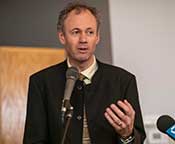 When the STEEP planning committee for FLUOROS 2020 decided that the in-person conference had to be postponed due to COVID-19, two things happened: FLUOROS 2020—now 2021— was rescheduled for Oct 3-6, 2021 and STEEP trainees decided to take on the planning and execution of a virtual conference. Their profound concern regarding social and environmental justice was the catalyst for PFAS In Our World: What We Know and What We Can Do. October 13-14, 2020. Stay tuned for the report on this event targeted for other SRP trainees and early-career scientists but open to anyone.
When the STEEP planning committee for FLUOROS 2020 decided that the in-person conference had to be postponed due to COVID-19, two things happened: FLUOROS 2020—now 2021— was rescheduled for Oct 3-6, 2021 and STEEP trainees decided to take on the planning and execution of a virtual conference. Their profound concern regarding social and environmental justice was the catalyst for PFAS In Our World: What We Know and What We Can Do. October 13-14, 2020. Stay tuned for the report on this event targeted for other SRP trainees and early-career scientists but open to anyone.
 Research Highlights
Research Highlights
Grouping Strategies for PFAS regulation
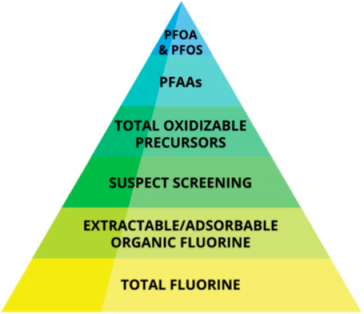 In a recent paper, STEEP director Dr. Rainer Lohmann and fellow coauthors advise on best scientific and regulatory grouping strategies for PFAS to protect human and environmental health. Read More…
In a recent paper, STEEP director Dr. Rainer Lohmann and fellow coauthors advise on best scientific and regulatory grouping strategies for PFAS to protect human and environmental health. Read More…
New research examines suspected links between PFAS exposure and COVID-19

While many factors can play a role in the severity of COVID-19 infection, patients at high risk of severe illness often suffer from other chronic diseases. New research is investigating how environmental stressors, such as PFAS and other endocrine disrupting chemicals (EDCs), may contribute to chronic diseases and, in turn, aggravate the course of COVID-19. Read More…
Novel Research finds HFPO-DA in Arctic Seawater for the first time
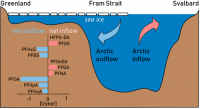
As concerns rise about pervasiveness of PFAS in the environment, scientists examine the most remote regions on Earth. A new research study investigating 29 PFAS compounds in the Arctic Ocean, finds HFPO-DA for the first time in Arctic seawater and provides evidence for the increasing importance of atmospheric deposition to long-range transport of PFAS. Read More…
Trainee Morales-McDevitt Explores the Relationship Between PFAS in Indoor Environments and Waste Water Treatment Plants

STEEP trainee Maya Morales-McDevitt seeks to understand the relationship between volatile PFAS in indoor environments, waste water treatment plants, and their contribution to atmospheric contamination of PFAS. Read More…
New Research Finds that PFAS disrupt and weaken bacterial membrane lipids

In a recent experiment, where modeled bacteria membranes as well as laboratory exposure experiments were conducted, it was found that PFAS disordered cell membrane lipids, weakening the membrane, potentially causing cell misfunctions and death. Read More…
 Events
Events
Join STEEP for the trainee run “PFAS In Our World” Virtual Conference October 13-14
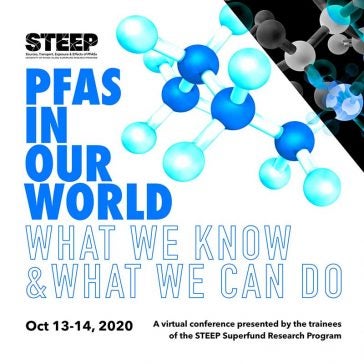 Policy, health, and justice—focus of October meeting on PFAS contaminants in drinking water. Virtual conference highlights next generation of scientists working to address contamination crisis. Read More…
Policy, health, and justice—focus of October meeting on PFAS contaminants in drinking water. Virtual conference highlights next generation of scientists working to address contamination crisis. Read More…
Dr. Angela Slitt presents latest research at Federal Information Exchange virtual workshop
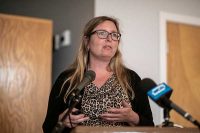
Dr. Angela Slitt presented her research on the link between PFAS exposure and nonalcoholic fatty liver disease, at a recent Federal Information Exchange virtual workshop. Her research finds that PFAS exposure has the capacity to induce gene expression Read More…
 Program Updates
Program Updates
Two STEEP trainees win K.C. Donnelly Externship awards
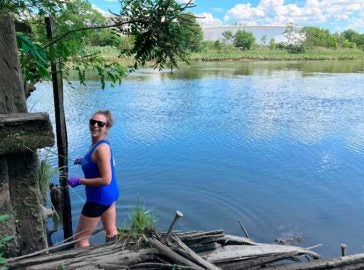
STEEP Trainees Anna Robuck and Juliana Agudelo were recently awarded NIEHS KC Donnelly Externships to work with the U.S. Environmental Protection Agency Office of Research and Development in North Carolina. Read More…
Training Core Announces New Action Team Model
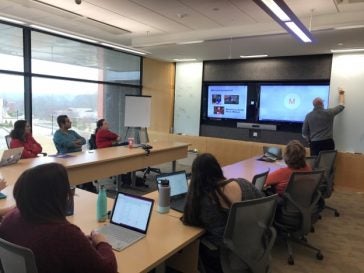
Beginning in the fall of 2020, the Training Core is introducing a new Action Team model, which is organized around different extension themes, and allow STEEP trainees to work on applied aspects of their research through education, outreach, or policy. Read More…
Alumni Highlight: Marisa Pfohl now a postdoctoral fellow at the U.S. Environmental Protection Agency

Recent STEEP graduate, Marisa Pfohl, is now a postdoctoral fellow at the U.S. EPA’s Center of Environmental Solutions and Emergency Response, where she works on detection methods to aid in decontamination efforts and risk assessment to inform emergency response following a spill. Read More…
Trainee Highlight: STEEP Welcomes New Trainee Charlotte Wagner
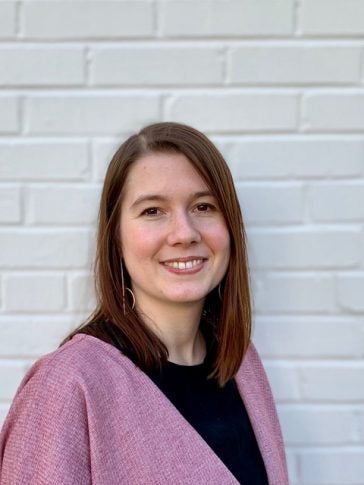
Charlotte Wagner, a PhD candidate in Elsie Sunderland’s research group at Harvard, recently joined STEEP as a new trainee. Her research examines the global fate and transport of persistent pollutants in the environment. Read More…
 Community News
Community News
STEEP Cape Cod Community Updates Go Virtual!

STEEP is planning a series of monthly webinars to keep in touch with Cape Cod residents, where members will share updates on STEEP research, talk about the latest changes in state and federal policies, and provide information to empower attendees to understand PFAS risks and take action. Read More…
 Voices From STEEP
Voices From STEEP
“Over the past 10-15 years we’ve really developed this super negative picture of what PFAS do to humans. But we’ve barely scratched the surface of that in wildlife … PFAS in wildlife is kind of the wild west. Wildlife are inherently difficult to study in a lot of ways.” –Anna Robuck, The Revelator Read full story here
“We really need to understand the connection between exposures at the individual level and Covid-19 severity.” –Philippe Grandjean, The Intercept Read full story here
“There’s a lot that we know from science and a lot of that we don’t know. In both PFAS and coronavirus there is a lot of evidence that shows people should take precautionary measures.”—Laurel Schaider, Cape Cod Times Read full story here
“There are over 3,000 on the market and it’s too challenging to regulate and understand them one by one.” –Angela Slitt, EcoRhodeIsland Read full story here
“The worst thing is for a state such as Florida to pretend that there is neither a problem with PFAS nor contamination of drinking water.” –Rainer Lohmann, Miami New Times Read full story here
Read the 2025 Issue 1 Newsletter
Read the 2024 Issue 2 Newsletter
Read the 2024 Issue 1 Newsletter
Read the Spring/Summer 2023 Newsletter
Read the Winter 2023 Newsletter
Read the Winter 2022 Newsletter
Read the Spring 2021 Newsletter

